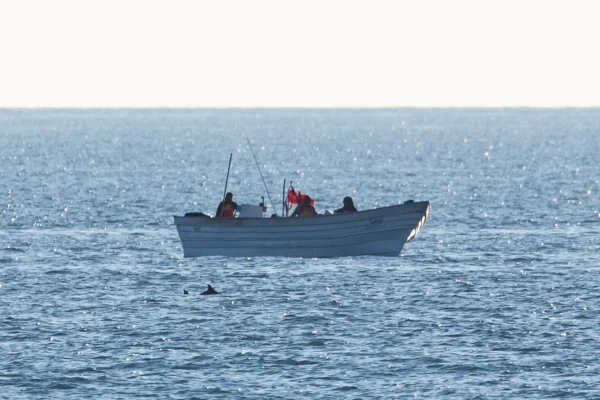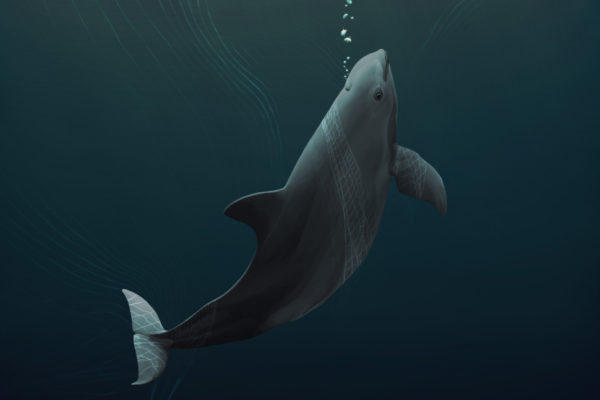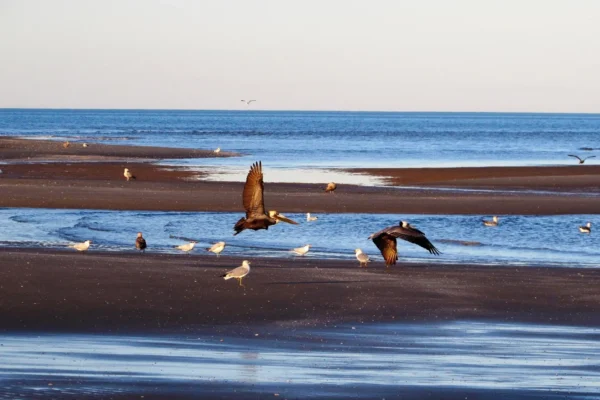What is the Vaquita?
The vaquita is a small porpoise found only in the northern Gulf of California (Sea of Cortez) in Mexico. Fewer than 20 of these animals remain, making the vaquita the most endangered marine mammal in the world.
What is the vaquita?
The vaquita (Phocoena sinus) is the world's smallest cetacean. Its name means "little cow" in Spanish. A dark ring around the eyes is its most striking feature, along with a proportionally large dorsal fin. The vaquita is unique among the porpoises as it is the only species of that family found in warm waters, and the size of the dorsal fin is believed to be an adaptation to that, allowing for extra body heat to dissipate. Vaquita only live in the northern Gulf of California, the Sea of Cortez, Mexico.
Like many other species of porpoise, vaquita tend to be shy and elusive, avoiding boats when approached. They are most commonly sighted in shallow waters up to 50 metres deep. And like their closest relative, the harbour porpoise, they tend to prefer turbid, nutrient-rich coastal waters which attract their preferred prey: small fish, cephalopods and crustaceans.
What are Porpoises?
Porpoises are among the smallest members of the cetacean family (whales, porpoises and dolphins). They are only distant relatives of dolphins (they last had a common ancestor roughly 15 million years ago). There are only seven species of porpoise; the most popular being the widely distributed harbour porpoise.
Many species, including the vaquita, are barely studied. Most of what we know about them comes from examining animals that have been washed ashore.
Why is the Vaquita endangered?
The vaquita population has been in sharp decline for decades, recently accelerated by illegal fishing with gillnets for the endangered totoaba, a large fish sought after for its swim bladder.
Gillnets: The Invisible Killer
The single most significant threat to the vaquita's survival is accidental entanglement. The small animal frequently gets caught in fixed fishing nets (gillnets), as by-catch. Unable to surface for air, the entangled animals drown within minutes. This threat is accelerated by illegal fishing for another endangered species that lives in the vaquita habitat, the totoaba ─ a large species of fish sought after for its swim bladder, driven by demand from China where it is considered a delicacy with medicinal value.
Gillnets are particularly dangerous because they are indiscriminate. While usually designed for a single species, large amounts of unwanted by-catch are inevitable. More than 300,000 whales, porpoises and dolphins get entangled in fishing nets annually. Most of them die, and the few that get away do so with severe injuries.
Ban on Gillnet Fishing in the Sea of Cortez
In April 2015, the Mexican government announced a two-year ban on gillnet fishing in the vaquita habitat, to be enforced by the Mexican navy. Conservation organizations welcomed the initiative, but stressed that unless the ban was made permanent, the measure did not go far enough. In July 2016, a permanent ban was finally announced, together with a ban on night fishing to aid the fight against poachers. However, it is illegal fishing that is responsible for the vaquita's dramatic decline, and that is unlikely to stop immediately.
It is now up to Mexico to enforce the ban, and for the international community to curb the market for totoaba swim bladders in China and to go after poachers. The fight to save the vaquita continues.
The Solution: End Gillnet Fishing Forever
There is nothing else we need to worry about other than gillnets. If we remove the gillnets, we will likely save the vaquita.
Dr. Anna Hall, Porpoise Conservation Society
How can I help save the Vaquita?
The window of opportunity for saving the vaquita is closing fast, but extinction is still preventable. You can help by making the right choices at the supermarket, by donating to conservation efforts, or simply by spreading the word.
Donate to Support our Efforts
Support our efforts to raise awareness and save the critically endangered vaquita porpoise from extinction with a symbolic adoption, for yourself or as a gift.
Spread the Word
The vaquita needs all the attention it can get. Support the conservation effort by spreading its story. Raise awareness by telling your friends and family about the vaquita porpoise.
Sign the Petition
Help us send a message to the Mexican government and the president-elect that this is the time to act..
(Download the PDF version to collect signatures in your community.)
Buy Sustainable Seafood
Entanglement in fishing nets is what is driving this species to extinction. You can help by making sustainable choices when buying seafood. There are programs to help you make that choice.
Write to Elected Officials
No matter where in the world you live, your voice counts. Political pressure on Mexico has been a driving force for action in the past. Let your elected officials know that you want them to support the vaquita conservation effort.
Support the Region
Support the region by providing an alternative to gillnet fishing. Spending your tourism dollars in the beautiful small communites along the Sea of Cortez is a great way to support the local economy.
Support Conservation Efforts
The vaquita is just one species in peril. Accidental entanglement in fishing nets is a major cause of unnecessary mortalities in countless species around the world. Support efforts to eliminate this threat!
Why is it so important that we fight to save the Vaquita?
The vaquita is not the only marine mammal in trouble, nor would it be the first of the whale and dolphin family to go extinct in recent years. The Baiji, or Yangtze River dolphin, was declared functionally extinct in 2006 when a survey mission failed to find a single individual in the Chinese waters it called home. Conservation efforts for this species that began in the 1970s had failed.
We must not allow for a second species of cetacean to become extinct in our lifetime. The vaquita is a unique animal, and an important predator. We do not know what consequences its disappearance would have for the entire ecosystem. Its decline is man-made and its extinction entirely preventable.
Let Mexico know you support the vaquita!
Mexico has done a few things help the vaquita, but none of it has been effective. It needs to intensify its enforcement efforts. Send a message to the Mexican President, commend him for his efforts to save the vaquita and encourage the Mexican government to keep up its efforts to remove gillnets from the vaquita habitat forever and to step up enforcement before the last vaquita have vanished.
Send your letters to:
Presidente Andrés Manuel López Obrador
Residencia oficial de Los Pinos, Molino del Rey s/n,
Col. San Miguel Chapultepec, Distrito Federal. C.P. 11850
You may also use this form (in Spanish) to send a message instead.
Frequently Asked Questions
What can I do to save the vaquita porpoise?
There are some very simple things you can do to support the vaquita conservation effort, ranging from just spreading the word to using your buying power when shopping for seafood.
Read more …How many Vaquitas are left in the world in 2023?
The most recent assessment by the International Committee for the Recovery of the Vaquita (CIRVA) presents a sobering outlook on the vaquita’s dwindling population. In 2018, CIRVA estimated that a...
Read more …What efforts have been made to save the vaquita?
Since the vaquita was first described by science and shortly after declared "vulnerable" by the IUCN, numerous actions have been taken by the Mexican government to save the species. However, none of these actions have…
Read more …What will happen to the ecosystem if vaquitas go extinct?
The potential extinction of the vaquita, the world’s most endangered marine mammal, raises concerns not only for the species itself but also for the broader ecosystem of the Gulf of...
Read more …If there are only so few left, can we still save the vaquita?
We can't know for sure. But there have been several examples of marine mammal species that have come back from the brink of extinction. The vaquita population can recover if the immediate threat is removed…
Read more …What is the totoaba and how is it connected to the vaquita?
The totoaba (Totoaba macdonaldi) is a large, slow-growing fish found exclusively in the Sea of Cortez. Capable of reaching over six feet in length and weighing up to 220 pounds,...
Read more …
Latest Vaquita Updates
Scientists Spot Vaquita Mother and Calf Pair
Scientists with the international survey mission currently underway in the waters off San Felipe in Mexico’s Upper Gulf of California…
Read more …New Vaquita Survey Underway as Mexico Promises to Commit Additional Resources to Enforce Law
A new survey mission is underway in the Upper Gulf of California to count the last remaining vaquita while Mexico…
Read more …UNESCO Places Vaquita Habitat on World Heritage in Danger List
The UNESCO World Heritage Committee has designated Mexico’s Islands and Protected Areas of the Gulf of California as a World…
Read more …



